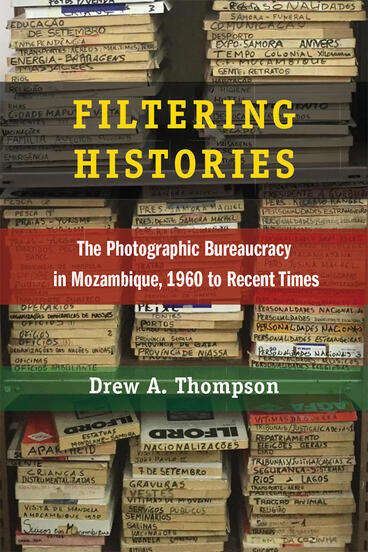Filtering Histories
The Photographic Bureaucracy in Mozambique, 1960 to Recent Times
Highlights the role of photography and other forms of aesthetic practice in processes of state formation and bureaucratic transition
Description
Photographers and their images were critical to the making of Mozambique, first as a colony of Portugal and then as independent nation at war with apartheid in South Africa. When the Mozambique Liberation Front came to power, it invested substantial human and financial resources in institutional structures involving photography, and used them to insert the nation into global debates over photography's use. The materiality of the photographs created had effects that neither the colonial nor postcolonial state could have imagined.
Filtering Histories: The Photographic Bureaucracy in Mozambique, 1960 to Recent Times tells a history of photography alongside state formation to understand the process of decolonization and state development after colonial rule. At the center of analysis are an array of photographic and illustrated materials from Mozambique, South Africa, Portugal, and Italy. Thompson recreates through oral histories and archival research the procedures and regulations that engulfed the practice and circulation of photography. If photographers and media bureaucracy were proactive in placing images of Mozambique in international news, Mozambicans were agents of self-representation, especially when it came to appearing or disappearing before the camera lens. Drawing attention to the multiple images that one published photograph may conceal, Filtering Histories introduces the popular and material formations of portraiture and photojournalism that informed photography's production, circulation, and archiving in a place like Mozambique. The book reveals how the use of photography by the colonial state and the liberation movement overlapped, and the role that photography played in the transition of power from colonialism to independence.
Drew A. Thompson is Assistant Professor of Historical and Africana Studies and Director of Africana Studies, Bard College.
Reviews
“Filtering Histories is insightful and innovative in both its approach and what it says about photography in Mozambique. The author demonstrates a thorough engagement with Mozambican history and historiography, and an in-depth knowledge of the current scholarship on African photography and visuality.”
- Pamela Gupta
—Pamila Gupta, WiSER, University of the Witwatersrand, Johannesburg, South Africa
"Thompson confronts the Western normativity imposed on histories of photography, a subfield that has failed to grasp Africa’s role in the development of the medium despite the daguerreotype’s almost immediate adoption across the continent following its public introduction in 1839."
- Art Journal
—Art Journal

